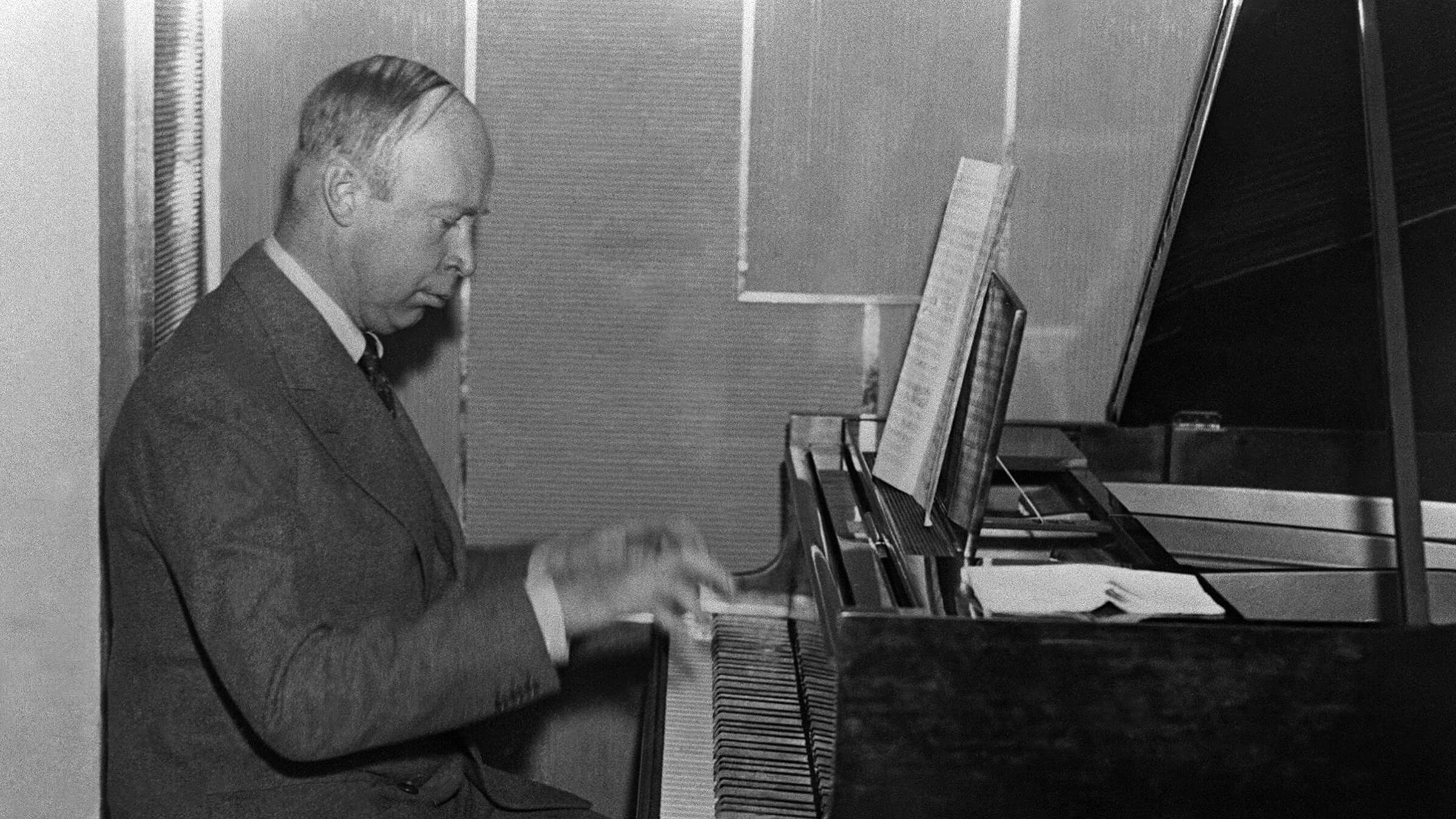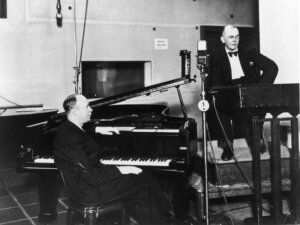Why Prokofiev once called himself ‘the only Jewish composer’
The Russian composer produced one of the most significant works about Jewish cultural identity

In 1920, Sergei Prokofiev composed an Overture on Jewish Themes, which features klezmer influences. Photo by Getty Images
This year marks the 70th anniversary of the death of Sergei Prokofiev, the Russian composer who produced one of the most influential modern musical works about Jewish cultural identity, although his personal views on Jews and Jewish nationalism remain a mystery.
When it came to Jewish women, Prokofiev found the Russian Jewish dancer Ida Rubinstein alluring, had an affair with the actress Stella Adler, and married the poet Mira Mendelson. He had further interactions with the singer Nina Koshetz, the harpist Eleonora Damskaya, as well as the actresses Shoshana Avivit and Dagmar Godowsky.
Yet, his 1941 opera Betrothal in a Monastery reflects antisemitic stereotypes even though his Jewish companion, Mira Mendelson, co-authored its libretto. Inspired by The Duenna, an 18th century comedy by Richard Brinsley Sheridan, Betrothal is about how a young woman avoids marrying a wealthy fishmonger, described in the opera as an “old orangutan’” and a “hairy ape.” In Sheridan’s original play, the fishmonger was unambiguously identified as “Isaac Mendoza, a rich Jewish merchant.”
The New Grove Dictionary of Opera claims that the “character of Mendoza is considerably softened in Prokofiev’s treatment,” and “Sheridan’s blatant antisemitism is as far as possible erased.” But musicologist Nathan Seinen plausibly argues that Prokofiev retained indirect allusions to Mendoza’s Jewishness, “enhanced by the musical characterization.” The result, according to Seinen, adds up to a “very negative image as a Jew.”
Klezmer-like sounds in Betrothal echo those in Prokofiev’s 1920 Overture on Hebrew Themes. Curiously, although Prokofiev was born, and spent much of his childhood, in Ukraine, he had never heard klezmer musicians playing there.

He studied at the Saint Petersburg Conservatory, which unlike other Russian institutions of higher learning at the time, accepted more than a token number of Jewish students. Prokofiev’s classmates included several who in 1908 formed a Society for Jewish Folk Music, although there is no evidence that Prokofiev took any interest in their activities.
In 1914, he did attend a Passover Seder, accepting an invitation from the legal scholar Iosif Gessen, a friend. Prokofiev jotted in his diary: “Today is apparently the Jewish Easter and I enjoyed tasting various national dishes and things to drink.”
Beyond fressing, there seems to have been little other cultural impact of Yiddishkeit on Prokofiev. Yet four years later, on a trip to New York, he attended a Yom Kippur service at an unnamed synagogue. He noted in his journal that he had hoped “to hear an aspect of singing new to me, some Jewish mumbling that would make an interesting impression. But there were only some clean-shaved bankers there in gleaming top hats listening to the monotonous reading of the rabbi.”
Despite this disappointment, Prokofiev reportedly approached the Zimro Ensemble, a Russian Jewish musical ensemble founded by clarinetist Simeon Bellison, then touring America. Prokofiev apparently proposed to write for the unusual formation of piano, string quartet and clarinet what would become the first composition by a non-Jew to be inspired by klezmer traditions, rather than Jewish liturgical chants.
The Zimro (Hebrew for singing) Ensemble had an explicitly Jewish nationalistic mission, and its American debut in Chicago in 1919 celebrated a local convention on Jewish statehood. In 1925, Bellison asserted in the Yiddish Forverts that music by Jewish composers cannot be considered Jewish if it “lacks the spark of a nationalist awakening.”
The Overture on Hebrew Themes is based on two melodies, taken from a notebook provided to the composer by Bellison. However, the first theme, a zesty group jig like a freilekh (happy dance) played by klezmers at Jewish weddings, is apparently not an authentic folk tune.
The music historian Nelly Kravetz explains that the theme used by Prokofiev is “at best folk-like. It might have been composed in klezmer spirit by Bellison, the leader of Zimro, or by someone else in the ensemble.”
However, the second theme that Prokofiev chose for Overture on Hebrew Themes was a genuine Yiddish wedding song: Zayt gezunterheyt, mayne libe eltern (“Be Well, My Dear Parents”) is a bittersweet anthem of post-marital departure from the family home.
The experience of writing this chamber work presumably tickled Prokofiev’s sardonic sense of humor. After all, Prokofiev also wrote a set of piano pieces entitled Sarcasms. So when other opportunities arose to collaborate with Jews, Prokofiev had characteristically snarky comments ready.
In 1924, Ida Rubinstein asked him to write music for a play about the Jewish heroine of the Book of Judith, a text excluded from the Hebrew canon. Prokofiev stated in his diary that according to Rubinstein, a Belgian director attached to the project “possessed a quality of suffering only a Jew can know, rather than a Frenchman.” Only Prokofiev, added Rubinstein, “would be capable of composing sufficiently profound music.” To which Prokofiev wisecracked: “Conclusion — I must be the only Jewish composer!”
He repeated this jest when Avivit, star of S. Ansky’s Dybbuk and a founder of Israel’s Habima Theatre, tried to commission Prokofiev to set a psalm text or passage from the Book of Isaiah. When Avivit alleged that Prokofiev was the only composer capable of writing a biblical work, he reflected: “Well, nothing new about that: after all, I am the only true Jewish composer!”
Prokofiev eventually disagreed with Avivit over biblical texts chosen to be set to music. He complained, “They were either the vengeance of the Jewish people, or implacable Sabaoth [Jehovah, Lord God of Sabaoth] sallying forth to wreak bloodshed among people. I was appalled, not having realized that such dreadful things were contained within the pages of the Bible!”
In 1934, the self-proclaimed pacifist composer belatedly, and rather unwillingly, orchestrated Overture on Hebrew Themes because others were already doing so for performances. Toiling at the task, he quipped to a friend: “The Jews are keeping me busy.”
But Ida Rubinstein had failed again in 1932 to lure Prokofiev into composing music. This time it was for a ballet, first discussed in 1925, about the building of Solomon’s Temple. Nor did negotiations in 1933 for Prokofiev to visit Palestine, at the behest of his former Conservatory classmate Solomon Rozovsky, ever become a reality.
He did work with the Hungarian Jewish conductor Eugen Szenkar, a musician whom he respected, but never befriended. Szenkar led the world premiere performance of Prokofiev’s Russian Overture in Tel Aviv in 1938. Less encouragingly, in 1939 Prokofiev denounced in a memo on Soviet music the Russian Jewish composers Isaak Dunayevsky and Dmitriy Pokrass for “schooling [the masses] in vulgarity.”
Amid this succession of missed opportunities, never-completed projects, and invective, Prokofiev’s Overture on Hebrew Themes stood out for its enduring popularity. From the first, it distracted attention away from Jewish composers whose works were also played by the Zimro Ensemble, including Joseph Achron, Grzegorz Fitelberg, and Pesakh Lvov, some overdue for rediscovery.
Musicologist Neil W. Levin concludes that Prokofiev might have “participated indirectly in the stirrings of Jewish national sensibilities of that time.” Even if done inadvertently, this achievement likely would have appealed to Prokofiev’s quirky, individualistic sense of drollery.
























